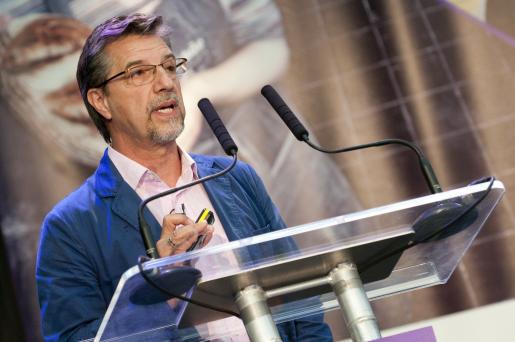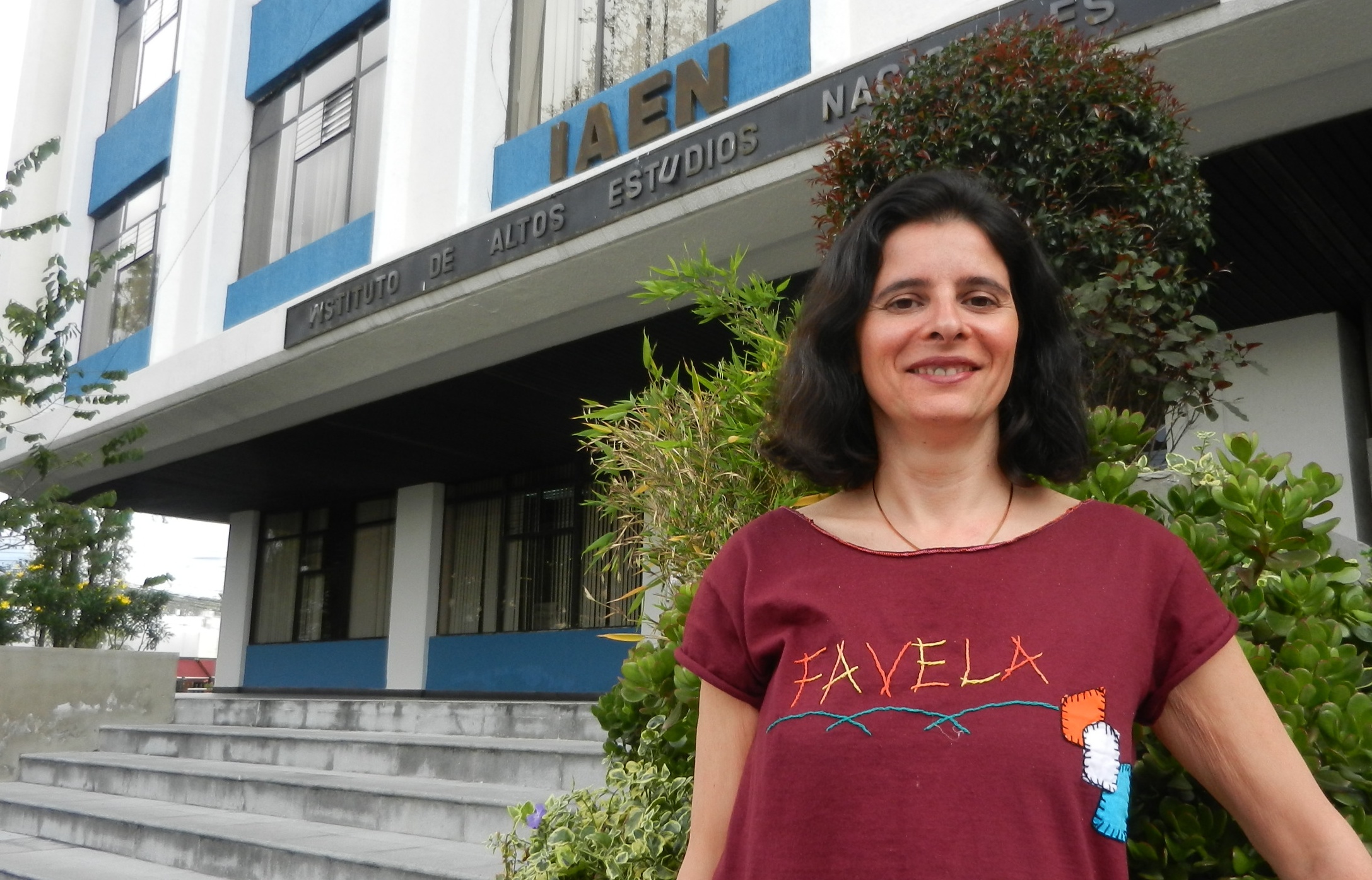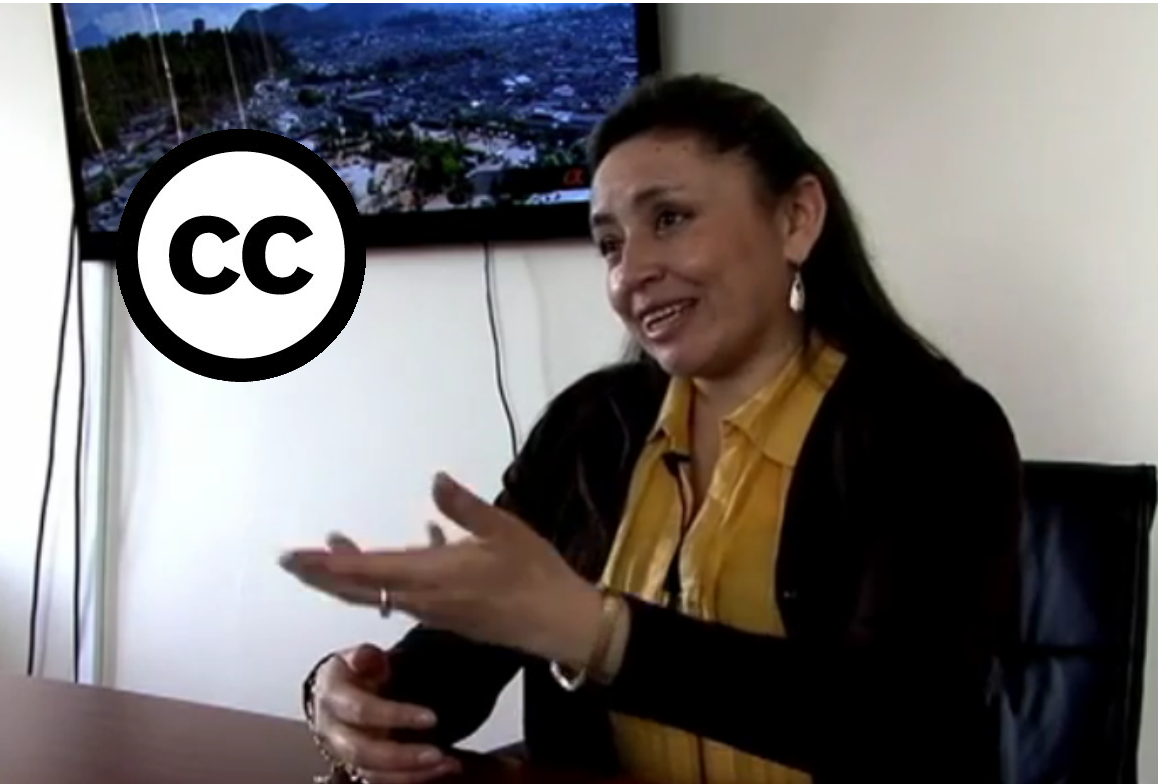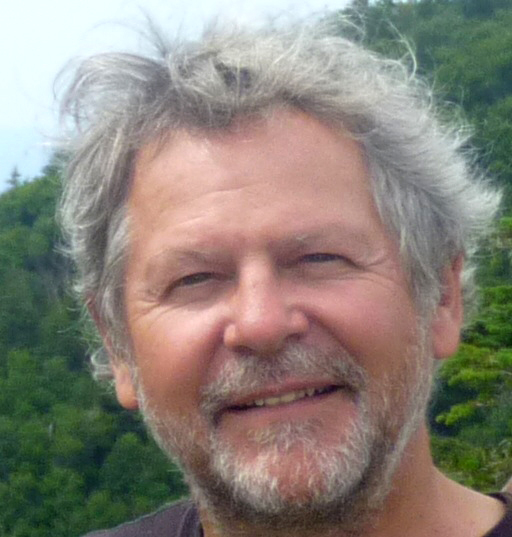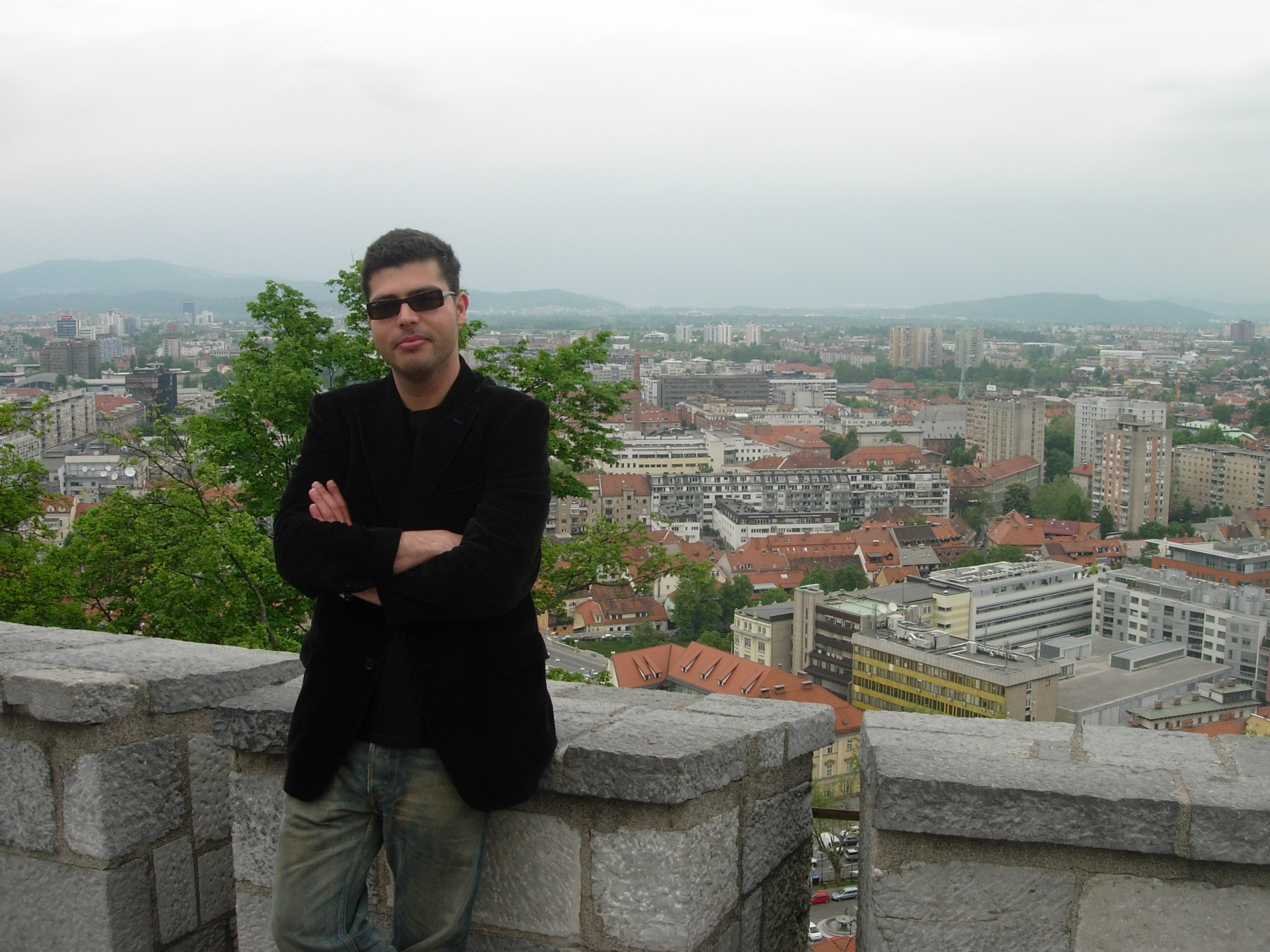
George Dafermos, el nuevo coordinador de la investigación de FLOK para el “Mejoramiento de Capacidades de Producción Orientadas al Procomún”, ha recorrido un largo camino desde que era adolescente en su ciudad natal, Heraclión en Creta, Grecia. Allí pasaba sus días jugando en una PC 286, conduciendo su motocicleta o nadando en el mediterráneo. Dejando su país natal, Dafermos viaja a Reino Unido donde estudia administración y ciencias sociales en la Universidad de Hertforshire para posteriormente regresar a su localidad a dar clase sobre desarrollo web en un centro comunitario, además de trabajar en distintos proyectos relacionados con la comunicación digital. Fue en este periodo en donde comienza su militancia en el mundo del copyleft y en contra de los dañinos efectos que tiene el sistema de patentes, con esta línea es que desarrolla su doctorado en Holanda dentro de la Universidad Tecnológica de Delft, en donde centró sus estudios en las estructuras de gobernanza de las comunidades de software libre.
Recuerda con gusto que a los 15 años un amigo le presentó un sistema operativo llamado Linux del que se enganchó inmediatamente por la forma en la que se había desarrollado, “un sistema operativo que es la parte más importante de una computadora había sido desarrollado, no por una gran compañía, sino por cientos de entusiastas agrupados en comunidades y conectados por Internet” recuerda, además añade que ese espíritu que lo atrajo a Linux es similar al que le atrae de FLOKS. Es a raíz de lo anterior que se pueden entender los intereses Dafermos y que actualmente se centran en la gobernanza de los comúnes, los modelos de producción entre iguales, las innovaciones abiertas, las comunidades y su organización potenciados por Internet.
Aunque nunca ha visitado sudamérica, se dice emocionado por conocer Ecuador, sobre todo por la oportunidad de construir una economía del conocimiento abierto para el país. En este tema afirma que se requieren construir infraestructuras para los usuarios finales y que se traduce sencillamente como dotar con herramientas a los ciudadanos además de dotarlos de una estructura legal que refuerce lo generado. La idea de integrar a los usuarios finales en el proceso de desarrollo, afirma, es vital en toda innovación ya que son una fuente constante de creatividad, por lo que ese considera es el concepto central para cualquier actividad emprendedora en el país.
Cree que el mayor reto para Ecuador y su intento de generar una economía del conocimiento abierto será la capacidad mantener un mente abierta ya que este cuerpo teórico rompe con muchos paradigmas por lo que puede resultar problemático para muchas personas, a pesar de que las comunidades en busca del conocimiento abierto han estado tantos años que ya no se considera un tema exótico en un número considerable de personas. Dafermos cree que una de las razones importantes para los así llamados países occidentales no adopten una economía P2P es que ésta se enfrenta a la hegemonía del neoliberalismo además de asumir que las economías de base común resultan más ineficientes que las del mercado actual.
Para concluir, el académico griego considera un error creer que las economías P2P sean una amenaza para la democracia y que por el contrario las estructuras generadas permiten mayor transparencia gubernamental, participación ciudadana y toma de decisiones, aspectos básicos para la democracia.
Para él FLOK/Buen Conocer es una oportunidad única de poner en práctica su conocimiento y experiencia en una escala que jamás imaginó.
-Conrado Romo
George Dafermos is heading up FLOK’s research stream for “Enhancing Commons Oriented Productive Capacities”. This week he began his work in Quito.
FLOK: Tell us a little bit about your life.
George Dafermos: I was born in 1980 in Heraklion-Crete, Greece. Some of my fondest memories as a young boy and a teenager growing up in the 1990s were playing computer games on a 286 PC, riding motorbikes and swimming in the Sea of Crete. In 1997 I finished high-school and moved to the UK to study administrative and social sciences at the University of Hertfordshire (BBA), Durham (MA) and Sunderland (MSc). Upon the completion of my postgraduate studies in 2002, I returned to my hometown, doing various stints as a lecturer in Information Systems and Web Development at a local independent study centre, a management & technology consultant with GoOnline (a EU programme aimed at promoting local entrepreneurship by training and counselling small and medium-sized businesses about using the Internet), a marketing & PR manager at the University of Crete’s Centre of Networks and Communications as well as a freelance web developer. Around that time I also got involved in copyleft activism, something which I still feel very strongly about, especially with regard to the harmful effect of patents and copyright law on innovation and creativity. In 2006 I relocated to the Netherlands to work on a PhD at Delft University of Technology on the topic of Governance Structures of Free/Open Source Software Development Communities under the supervision of Prof. Michel van Eeten. Six years later, after I defended my dissertation (which is available for download).
In December 2012, I came back to Greece with the aim of promoting the concept of the commons (for example, by helping co-organise the ‘Festival of the Commons’ in Heraklion-Crete) and agitating for peer-to-peer alternatives.
At what point did you become interested in what is now your life’s work? Was there a moment, a book, or a person that was influential?
Actually, yes. When I was fifteen years old, some friends showed me a little-known operating system called Linux. I was instantly hooked: in spite of its complexity – for an operating system is the most complex piece of software on a computer – Linux was not developed by some great company but by a loosely coupled community of thousands of enthusiasts who were scattered all over the world, connected only through the tenuous strands of the Internet. It was not, as they told me, the result of a meticulously crafted design but of evolution: the crystallization of a multitude of individuals doing their thing without central planning. The peculiar character of Linux only made me more curious about it, triggering a series of follow-up questions: How was it possible that something of such complexity was developed by a seemingly anarchic crowd on the Internet? How were the contributions of all those people, who were dispersed around the world, integrated into a harmonic whole? And if Linux was so much better than Microsoft Windows, as my friends claimed, then why was not everybody else using it? Such was the appeal of these questions that five years later I decided to do my Master’s thesis at Durham on the organisational structure of the Linux project and then do a PhD at Delft on the governance of free software and open source development communities. And it is questions of a similar nature that attract me to work on the FLOK Society Project.
How would you describe your current research interests?
My research interests are centred on the governance of the commons, on the model of peer production, on open/user innovation, on online communities and new organizational structures enabled by the Internet.
Have you been to South America or Ecuador before?
No, but I’m very much looking forward to doing so. I’ve long dreamt of visiting South America but the opportunity never arose until now.
Do you know when you will be coming to Ecuador and how long you will stay?
I’m planning to be there in early November and stay until the research is expected to be completed in the end of April.
How do you think your work will overlap with Ecuador’s national interest in building an open knowledge economy?
I think the best way to answer your question about how my involvement in the FLOK Society Project overlaps with Ecuador’s attempt to build an open knowledge economy is by saying a few things about the research on which my work will be focused. The aim of the research project is basically to highlight promising avenues for further consideration and implementation; to identify building blocks, so to speak, for the development of an open knowledge economy in Ecuador. A few examples immediately spring to mind.
First of all, an open knowledge economy requires infrastructures for end-user innovation: simply put, what this comes down to is giving people access to tools – all sorts of tools, from software tools to full-fledged workshops – so they can make by themselves those things they need and desire. Then there is the issue of the legal/IP infrastructure that will serve to reinforce such an environment of distributed innovation: the creative commons licenses offer a great example of how this can be done in practice: the point is to make it easy and simple for creators to decide for themselves how to distribute their products and the kind of rights they want to give end-users. In a way, it’s all about enabling choice; in fact, it’s hard to overemphasize the importance of developing infrastructures that allow people to choose how they want to engage in economic intercourse: that is why the character of such infrastructures must be ‘pluralistic’ and supportive of experimentation with alternative forms of economic organization such as cooperatives, mutuals or so-called local exchange trading systems and barter networks that can be used for the exchange of goods and services. In short, the overlap between my work and Ecuador’s interest in building an open knowledge economy consists in researching infrastructures which are geared towards enabling participation, collaboration, openness and choice.
How do you think concepts you have researched or discovered would work at the scale of a whole country? Do you know of any examples of something similar?
There is a multitude of highly interesting and relevant concepts, although no systematic attempt has yet been made to implement them at the scale of a whole country. Take, for instance, the concept of open innovation, which is essentially (a theoretical corpus) about how companies can make better products and services through the participation of end-users in their development. The idea behind it is that end-users represent a potent source of creativity and innovation and companies can harness that capacity for innovation by engaging end-users in the process of developing products and services. That is obviously a concept that may well be applied to the totality of entrepreneurial activity in any country. Another very interesting concept is that of open source: at its heart, the concept of open source suggests that technology products should not be built as ‘black-boxes’ that hinder understanding of how they work ‘under the hood’. On the contrary, one should be able to study their ‘internals’ so as to be able to modify them or fix their defects, thereby improving them. The rationale is that technological innovation is a cumulative process that thrives on openness and collaboration rather than secrecy. It is not hard to see how the relevance of the concept of open source, like that of open innovation, extends far beyond the scope of any one product and may well be implemented as an organizing principle for an entire country’s economy and industry. And what’s more, there are many more concepts – some of which are closely related to that of open source and open innovation – that could prove to be very useful in reflecting about the development of a participative and open knowledge economy.
What do you see as the main challenges in Ecuador’s proposed shift to a shared and open knowledge economy?
For starters, such a paradigm shift requires an open mind and a strong willingness to try out alternatives.
Peer-to-peer, Internet-based alternatives (in commerce, education, information exchange, collaboration, etc) have been around for a couple of decades now. What is different in this realm now, than ten or 20 years ago? Or: why is Ecuador the first country to talk about converting to this economic model?
Lots of things are quite different now: one of the most important has to do with the fact that such alternatives are no longer ‘exotic’, fringe’ experiments driven by small groups of people. Instead, there is an explosion in the number of people who are interested in examining and using them as solutions to the practical problems they face and that, I believe, gives such alternatives a powerful impetus for further development. At the same time, the technology enabling these alternatives is far more developed now, opening up a wealth of new possibilities. Consider, for instance, how widespread broadband connectivity has made it possible to use the Internet in ways that were inconceivable for most users in early 2000s: videoconferencing and sharing videos on websites like youtube are two prominent examples. Most promisingly, all this is nothing compared to what the Internet could be after ten or twenty years: there is huge potential for innovation that remains to be explored.
I think one of the most important reasons that prevent many countries, especially in the so-called Western world, from adopting what we could call a peer-to-peer economic model lies in the hegemony of the neoliberal dogma and its attendant belief that a commons-based economy results in waste of resources and is therefore inefficient.
Crucially, that is starting to change as increasingly more countries realize that neoliberal economic policies are not only incapable of solving their problems but are, if fact, aggravating them. That is exactly the case with many countries in the south of Europe today (like Greece, Italy, Spain and Portugal, to name but a few) which have been made painfully aware of the fact that the economic agendas they have so far pursued lead to a model of one-sided development that creates wealth for the few while reducing the many to poverty; a model that produces unhappiness and insecurity as the majority of people are excluded from the very things (like education and healthcare) that enable life to blossom and thrive, to say nothing about its destructive effect on the environment. So, I think that as the realization sets in that another way of doing things is indeed possible, we’re going to see more and more countries following in the footsteps of Ecuador.
What are you looking forward to, about this project? Is there anything you are not looking forward to?
To begin with, joining the FLOK Society Project is a unique opportunity to put the insights I’ve gleaned from my study of open source projects into practice. Something of this scale has never been attempted before and I would definitely like to be part of it. Furthermore, I’m really excited to work on a project that combines both research and policy work.
